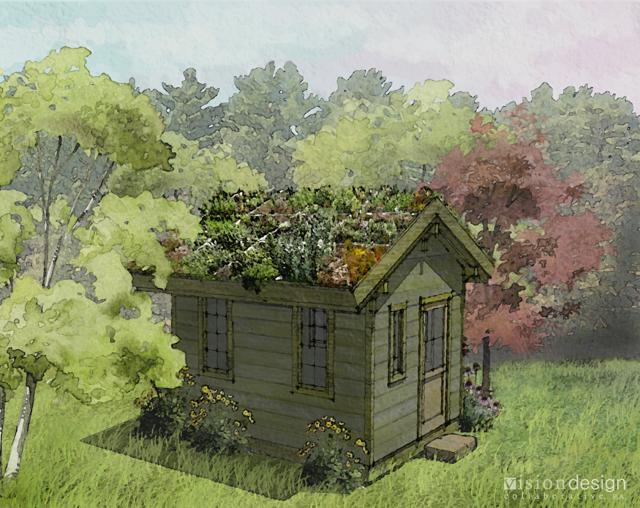The seventh annual Green Building Directory, a joint project of the WNC Green Building Council and Mountain Xpress, hits the streets March 23. The handy guide is your key to local resources for environmental building. In that spirit, here’s a review of local sustainable-building news.
It’s alive!
If you’ve ever admired a living roof (see illustration) but figured it was just too risky or complicated to try building one yourself, think again. Local plant ecologist Emilio Ancaya has teamed up with the Asheville-based Wilson Architects to create plans enabling do-it-yourselfers to build a garden shed with a living roof.
Besides looking pretty, living roofs offer numerous advantages, such as reducing storm runoff and providing habitat for plants and pollinators. They also last far longer than most conventional roofs.
Although several local contractors can now install the underlying membrane that supports a living roof, Ancaya and his wife/business partner, landscape architect Kathryn Ancaya, “were the first in the Southeast to specialize solely in green roofs” when they launched their business eight years ago, he told Xpress from a job site in Florence, S.C., where they were installing a living roof atop the federal courthouse.
Living roofs, he reports, can easily go 50 years without repairs, as the soil and plant material protect the roof from its greatest source of damage: solar radiation.
“We’ve had tons of calls asking, ‘How do I keep soil on the roof?’ ‘How does it drain?’ So we decided to produce these plans that walk you through the whole process.”
For more information, check “our services” at livingroofsinc.com.
A good fit
The Feb. 28 installment of the Blue Ridge Sustainability Institute’s Green Mondays forum explored the latest technologies for reducing buildings’ energy use. “Buildings, and the appliances in them, accounted for 42 percent of energy use nationwide in 2009,” reported Lenny Bernstein, a principal at the institute. Most appliances are short-lived, and replacing old ones can yield energy savings. But buildings may last a century or more, and improving their efficiency requires retrofitting.
A panel of experts offered a wealth of ideas for cost-effective green retrofits. Most U.S. homes waste 30 percent of the energy used, noted Carl Donovan of the Asheville-based Conservation Pros; the average homeowner could save $500 a year by reducing that figure. “A reliable benchmark for our area is that if you heat with gas or electricity, during the coldest month of the year you should be spending about 10 cents per square foot to heat your house,” he said. “If you’re spending more, you could achieve significant savings by improving your home’s energy efficiency with [projects] identified by an energy audit.”
People often focus on replacing windows, noted Donovan, but unless you have very poor quality windows, replacing them yields a much lower return on investment than things like sealing air leaks and ducts, and adding insulation.
Marcus Renner, a certified energy auditor, showed how an audit can identify what steps are needed and determine their relative cost-effectiveness. “Because we as homebuyers want low purchase price,” he pointed out, “most homes are built to minimum building-code standards, without considering what this means for heating-and-cooling cost or comfort.”
And once you’ve made those basic improvements, said Frank Marshall of the Asheville-based FLS Energy, solar hot water — which has a five- to seven-year payback — is the most effective step you can take to boost your home’s energy efficiency.
Finally, Progress Energy staffer Kathleen Stahl described the utility’s Energy Efficiency for Business program, which offers nonresidential customers rebates for installing energy-efficient lighting, heating/cooling, refrigeration and high-efficiency electric motors, and for going “beyond code” in constructing new buildings.
Readers can learn more at http://bit.ly/eAgCKX.
Thomas headlines home show
The 36th annual Western Carolina Home Show (Friday through Sunday, March 18-20, at the Asheville Civic Center) will feature more than 250 exhibits staffed by some 1,500 consultants, artisans, designers and salespeople. Keynote speaker Steve Thomas, best known for his 14 years as the eco-savvy host of the popular PBS series This Old House, is now seen on Renovation Nation, part of Discovery Channel’s Planet Green network. The program focuses on green home improvements, sustainability, energy efficiency and environmentalism.
Tickets ($6, kids 12 and under get in free) are available at wnchomeshow.com or at the door.
— Direct your environmental news to Susan Andrew (251-1333, ext. 153, or sandrew@mountainx.com).




Before you comment
The comments section is here to provide a platform for civil dialogue on the issues we face together as a local community. Xpress is committed to offering this platform for all voices, but when the tone of the discussion gets nasty or strays off topic, we believe many people choose not to participate. Xpress editors are determined to moderate comments to ensure a constructive interchange is maintained. All comments judged not to be in keeping with the spirit of civil discourse will be removed and repeat violators will be banned. See here for our terms of service. Thank you for being part of this effort to promote respectful discussion.